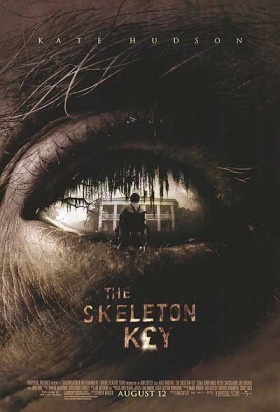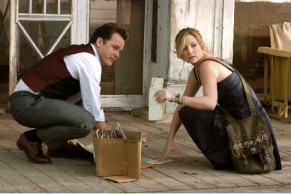|
The
Skeleton Key
David Lynch, of all people, once said, "It's a very
good thing if you keep your eye on the donut and not on
the hole.” Lynch was referring to the donut as the
story a filmmaker intends to tell, and the hole could be
anything that detracts from the telling of that story.
Some
filmmakers get lost in the hole by focusing too much on
the technological aspects of filmmaking (see George Lucas),
and others get carried away in visual aesthetics (see Peter
Greenaway). In Lucas’ respect, the obsession with
the hole has a retrograde effect whereas Greenaway’s
work, depending on taste, can transcend the need for focus
in regards to story.
What
does any of this have to do with The Skeleton Key?
Nothing and everything. You see, either director Iain Softley
(K-Pax and Hackers) or scribe Ehren Kruger
(The Ring, The Ring 2) or both, seem to have suffered
the ill-effects of “hole-infatuation” as well,
and the outcome is a snore-inducing escapade with smatterings
of interest here and there.
Smatterings,
however, are not enough to make a decent film.
The
hole in question is pandering to the conventional devices
of modern horror films far too often, and it stifles every
interesting aspect of The Skeleton Key to the point
of suffocation. The outcome of the film does not support
the shock and fright sequences that become more and more
prerequisite for films of these ilk, but by the time audiences
put this all together they won’t care to muster disconcert.
Caroline
Ellis (Kate Hudson) is haunted by the death of her father,
and her absence while on a trip of self-discovery which
prevented her from being there to care for him in his last
days. This regret has curbed her need for self-discovery
and paved a path of hospice for her while on the road to
nursing school.
We meet
her at a low point in her progression, the business end
of hospice care for the elderly disenfranchises her with
her station at an old folk’s home, and she decides
to answer a personals ad request live in care for an elderly
stroke victim named Ben Devereaux (John Hurt).
Not
bad you say? Me too, initially. Hudson is the type of actress
that can glean sympathy with little effort, and she works
this to her advantage. It’s nice to see her back in
the game, but not at this price. Caroline’s new digs
finds her knee deep in the bayou, confronted with Hoodoo,
a practice akin to Voodoo just minus the religious aspects.
It takes
a while to get the pot boiling, but when it does the ghost
story at the meaty center is actually pretty intriguing.
The gist is that a pair of hoodoo practicing slaves named
Mama Cecile (Jeryl Prescott Sales) and Papa Justify (Ronald
McCall) were lynched on the grounds, and are now believed
to be haunting the house because of their wrongful deaths.
Ben’s
wife, Violet (Gena Rowlands), believes that these spirits
were behind her husband’s stroke, but Caroline is
suspicious and digs deeper and deeper to uncover the truth.
The
marketing of this film will prove fatal, as the majority
of the attending audience seemed to expect a hack and slash
film, and felt cheated by the rather somber and at times
insightful plot. If only this film had dismissed its attempts
to hold onto the “horror” aspects of the plot,
and hence the senseless and inexplicable scares interspersed
to keep viewers awake. Then it could have gone from a D
to a solid D plus / C minus in my book.
Alas,
the hole conquers all.
Rating:

|







